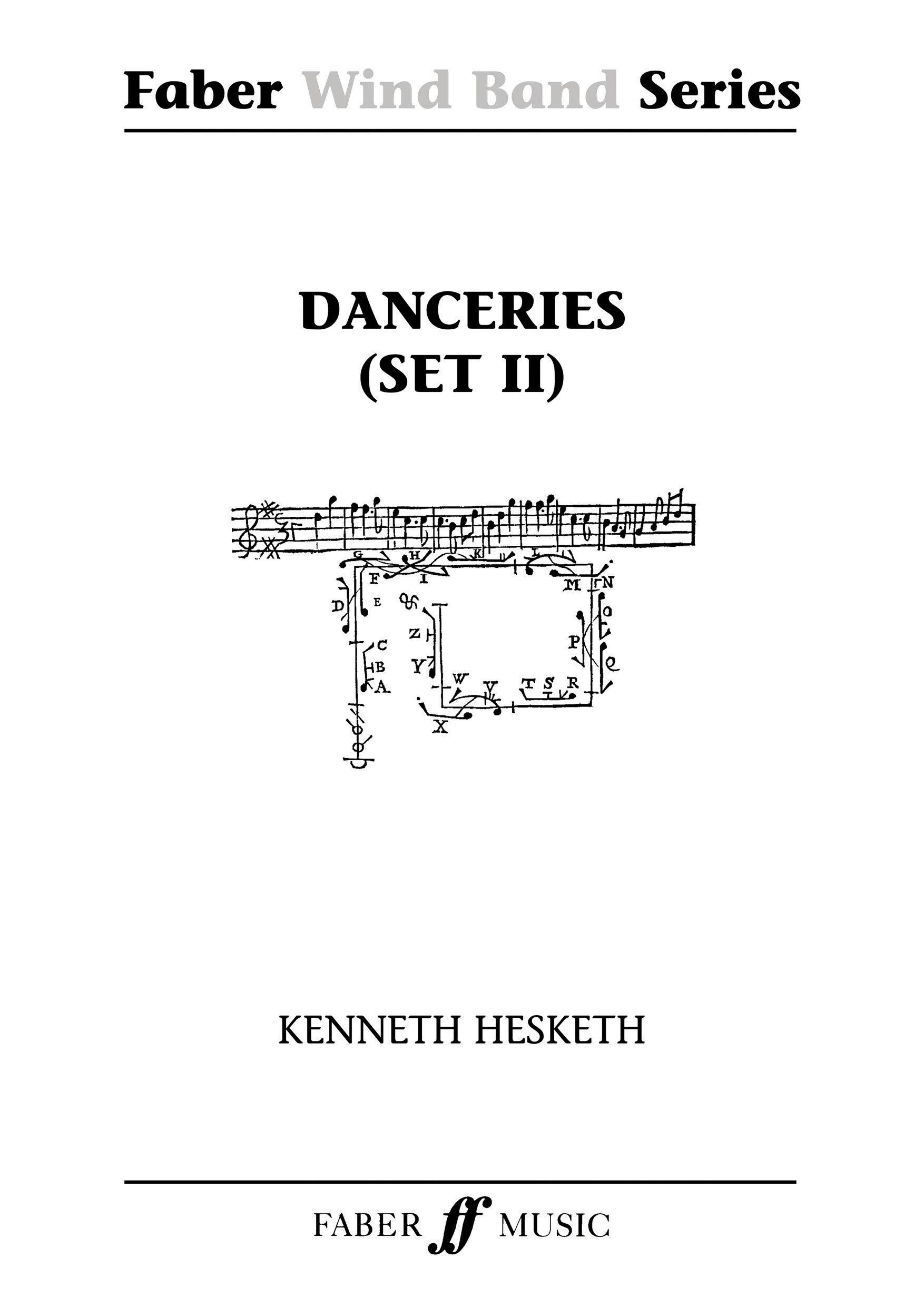Results
-
£125.00
Danceries (Set II) - Kenneth Hesketh
Danceries Set II was commissioned by Keith Allen and Birmingham Symphonic Winds, supported by PRS for Music Foundation and the RVW Trust. The world premire of this work was given by Birmingham Symphonic Winds, conducted by Keith Allen, at the CBSO Centre, Birmingham in 2011. This second set of Danceries continues the format established in Danceries (Set I), namely in using material taken from Playford's Dancing Master, a collection of folk and popular tunes published in the seventeenth century, to form the basis of an extended dance suite. In this set, the melodies have been more abstracted and project only a distant echo of their original forms, but as before, each movement is self-contained, colourful and direct, with its own distinct mood.The outer movements - Jennie's Bawbee and Peascod's Galliarda - share a use of driving percussion writing with a military air. Tom Tinker's Toye and Heart's Ease (movements two and three) are both settings of original melodies. All movements are more extended than in the first set, with a freer use and approach to the material; melodies now occur in various keys and are supported by a greater variety of harmonic colouring. The result is a richer, even more exhilarating set of dances. Danceries has come of age!
In stock: Estimated delivery 1-3 days
-
 £37.37
£37.37Elizabeth Remembered (Wind Band) Debbie Wiseman arr. Andrew Wainwright
Released as a charity single in aid of The Queen's Commonwealth Trust, this sublime work was composed by Debbie Wiseman OBE and performed by the BBC Concert Orchestra in tribute to Queen Elizabeth II after her death in September 2022. This tender and contemplative piece was played many times during the BBC's live coverage of the ceremonies across ten days of national mourning; and the full three-minute piece was played at the end of the Queen's State funeral, following Kirsty Young's emotional final words, and accompanied by a poignant and beautiful montage of images from the events of the day. The piece is now available for wind bands through this arrangement by Andrew Wainwright, with permission kindly granted by Debbie Wiseman. To view a follow-the-score video please visit: www.youtube.com/watch?v=gW6AiNQGKEI Sheet music available from : UK: www.wind-band-music.co.uk USA: www.solidbrassmusic.com Difficulty Level: Medium Easy Instrumentation: Flute Oboe 1 Oboe 2 (Cor Anglais) Clarinet in Bb 1-2 Bassoon 1-2 Alto Saxophone Eb Tenor Saxophone Bb Baritone Saxophone Eb Trumpet in Bb Horn in F Trombone Euphonium Tuba Timpani Harp (optional) Glockenspiel (if no Harp) Suspended Cymbal
In stock: Estimated dispatch 1-3 days
-
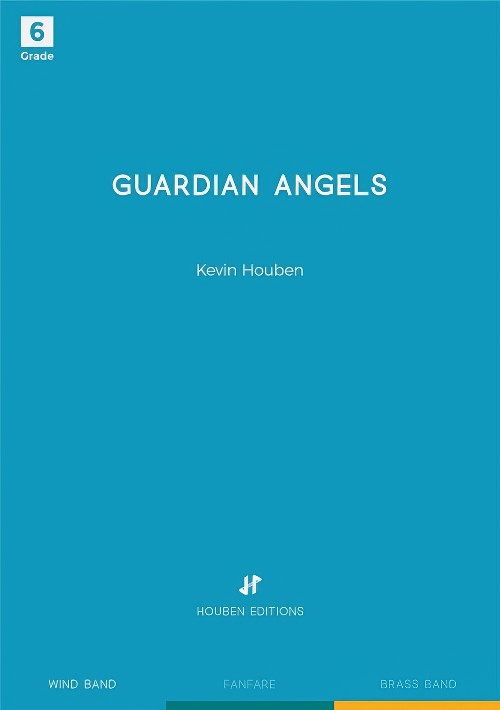 £159.99
£159.99Guardian Angels (Concert Band - Score and Parts) - Houben, Kevin
Guardian Angels gives a musical expression to the legend of Reverend Louis Henri Bahler referring to the use of Psalm 34. North-west Veluwe and in particular Oldebroek (The Netherlands) has a very rich religious tradition which is demonstrated by its monumental churches. They tell the story of a stirring history in which Reverend Bahler played a crucial role. Inspired by his arrival as a pastor in 1870 in the neighbouring Oosterwolde, two big religious communities came into existence with their characteristic churches but this rivalry also resulted in great social unrest. This composition reflects on this striking personality and in particular on the story of the Angel Guard. 'One evening Reverend Bahler has given a sermon in Oldebroek and he walks over the Church path through the pastures to Oosterwolde. On this dark and stormy evening Bahler's opponents are waiting for the pastor in ambush. They want to drown him in a watercourse near the Church path but abandon their plan because Bahler is accompanied by two men. The next day it comes to an encounter between Bahler and his opponents. They repent their, fortunately unexecuted, plan. Bahler firmly believes that on the previous night he walked alone over the Church path, and was not accompanied by two men. It was concluded that it must have been the angels who had protected Bahler.' Psalm 34 is central to this composition and this because of its powerful melody but also because the lyrics of verse 4 of the rhymed version fit in well with the special legend of Reverend Bahler: The Lord's angel gathered round him An invincible heavenly guard, Who tries God's will, around him So he's well guard(ed) A second melodious and harmonic cell is a musical transformation of the name 'Bahler'. This cell is varied in major and minor third chords and sometimes used as the main idea or apotheosis, but also serves as an accompanying cell or as a bridge between other melodic and rhythmic constructions. The composition was made possible by contributions of: Mr Evert van de Poll, owner of the Van Gelder Groep, Het Prins Bernhard Cultuurfonds Gelderland en Het Feteris Oosterbaan Fonds. Duration: 16.30
Estimated dispatch 7-14 working days
-
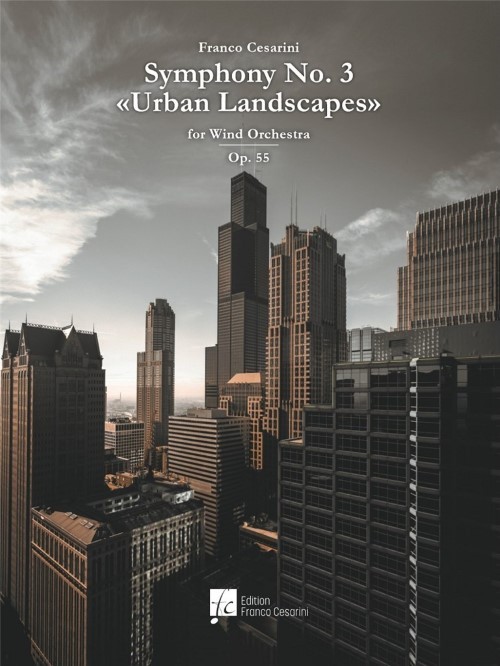 £407.00
£407.00Symphony No.3 (Urban Landscapes) (Concert Band - Score and Parts) - Cesarini, Franco
Fascinated by the beauty of Chicago, Franco Cesarini has translated his emotions into music: this is how Symphony No. 3 "Urban Landscapes" Op. 55, was born, a musical portrait of this metropolis overlooking Lake Michigan. The composition is divided into three movements: The Wrigley Building from Dawn to Noon, Blue Silhouette and Cloud Gates, which by sharing the same thematic material arranged in cyclical form, strengthen the overall cohesion of the piece. The first movement, preceded by a short slow introduction in which the main theme is presented in an almost dreamlike form, metaphorically represents the city at dawn. The sudden change of time symbolizes the start of activities with all its noises and sounds: you can hear the bell that announces the closing of the subway doors, the sound of cars speeding by, the siren of a patrol car. If the first movement represents the day, the second introduces a nocturnal environment: a melancholic melody played by the English horn anticipates a more animated tempo depicting melodies coming from jazz clubs. Powerful fanfares that take up the second theme of the first movement introduce the third movement. In this finale, the role of the two themes is reversed compared to the first movement and one takes the place of the other in a kind of games of mirrors. Symphony No. 3 "Urban Landscapes" Op. 55: a sumptuous musical portrait of the "Windy City". Duration: 27.00
Estimated dispatch 7-14 working days
-
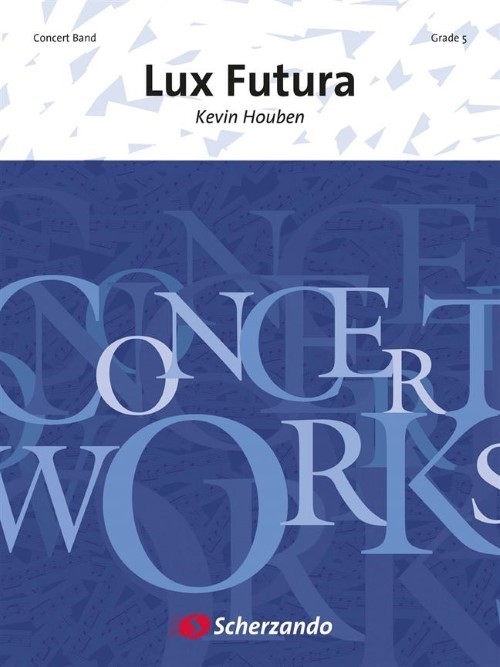 £224.99
£224.99Lux Futura (Concert Band - Score and Parts) - Houben, Kevin
Lux Futura (Light of the Future) was commissioned by the Royal Wind Orchestra Delft and is inspired by the letters 'D-E-L-F-T' using the letter notation system by B?la Bart?k. In this 'Delft' cell, there is referral to the 'Trinitas', the bourdon bell of the Old Church in Delft, that only tolls during a funeral of a member of the Dutch Royal Family. The Delft melody switches to the 'Agneta March', which is a reference to the history of the Royal Wind Orchestra Delft. Further on the love theme, played by the bass instruments represents the love of the inhabitants for their city throughout space and time. In the middle movement, the beauty of the city is depicted by the cor anglais (English horn) solo, as an ode to the lovely city of Delft. When performed, one can choose to use sound city samples recorded in Delft to create a truly magnificent spectacle. Duration: 17.00
Estimated dispatch 7-14 working days
-
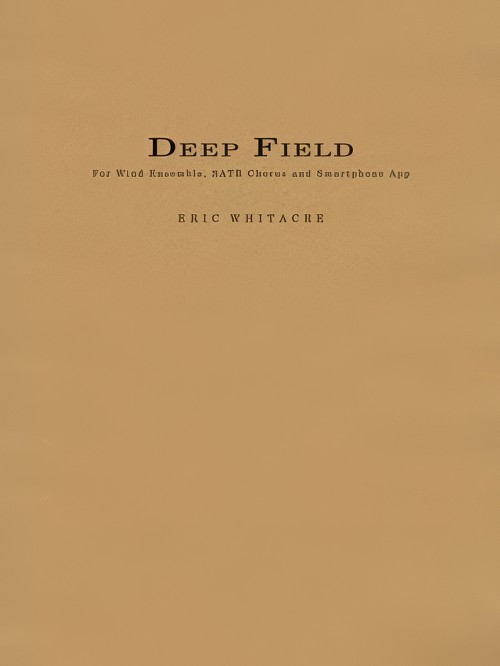 £499.99
£499.99Deep Field (SATB Chorus and Smartphone App with Concert Band - Score and Parts) - Whitacre, Eric
Score and Parts includes 40 choral octavos. Grammy Award-winning American composer Eric Whitacre's symphonic work Deep Field was inspired by the world's most famous space observatory, the Hubble Space Telescope, and its greatest discovery, the iconic Deep Field image. The new film - Deep Field: The Impossible Magnitude of Our Universe - illuminates the score by combining Hubble's stunning imagery, including never-seen-before galaxy fly-bys, with bespoke animations to create an immersive, unforgettable journey from planet Earth to the furthest edges of our universe. The soundtrack features a new, epic Virtual Choir representing 120 countries: over 8,000 voices aged 4 to 87, alongside the Royal Philharmonic Orchestra and Eric Whitacre Singers. The smartphone App playing the Deep Field electronica should be triggered by audience members from bar 217 to the end of the piece, as cued by the conductor. The app is free and must be downloaded in advance of the performance. It is available via the App Store and Google Play Store by searching "Deep Field." Duration: 20.00
Estimated dispatch 7-14 working days
-
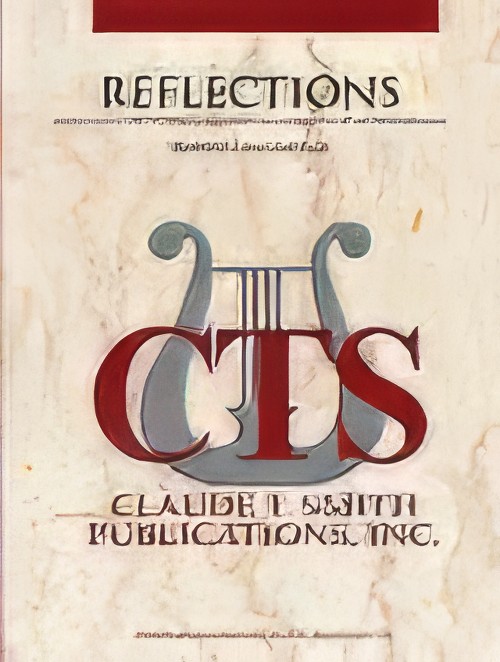 £96.00
£96.00Reflections (Concert Band - Score and Parts) - Langenfeld, Robert
Reflections is a musical portrayal of the people and moments in our lives which shape and change us. Musical elements from various sources are woven into a rich tapestry of sounds and colors that show the full expressive range of the band. Perfect for contest and festivals! Reflections by Robert Langenfeld, was commissioned by a consortium (alumni/friends/family/UCM Bands/ CTS Pubs) for Dr. Russell Coleman in celebration of his 90th birthday and his service as director of bands at the University of Central Missouri (CMSU) for 32 years. Langenfeld was given guidelines for the composition which included a clarinet soli (Coleman is a clarinetist), excerpts from "Dance Prelude" (commissioned by Dr. Coleman and the UCM Phi Mu Alpha chapter, written by Claude T. Smith for the CMSU (UCM) Band in 1978), the UCM Alma Mater and the UCM fight song, "Go Mules." This work was premiered on June 17, 2018 by the Warrensburg Community Band, under guest conductor, Dr. Anthony Pursell, at the 2018 Missouri Bandmasters Association Summer Convention at Tan-Tar-A in Osage Beach, MO. Dr. Russell Coleman has been the conductor for the Warrensburg Community Band since 1985. Duration: 5.30
Estimated dispatch 7-14 working days
-
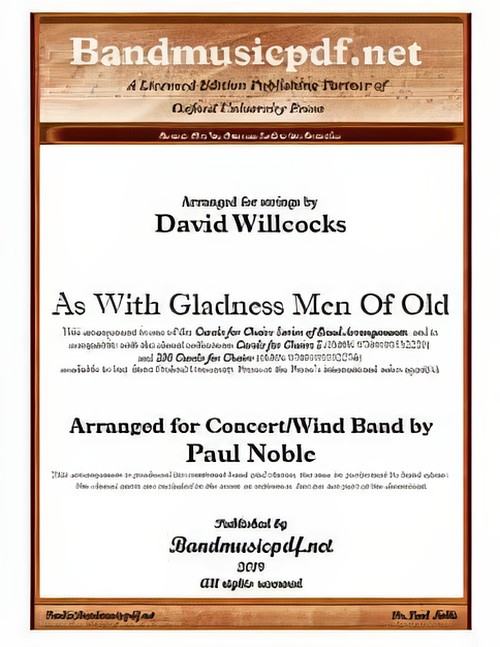 £75.00
£75.00As With Gladness Men of Old (Concert Band with Optional Choir - Score and Parts) - Noble & Willcocks
As with Gladness Men of Old is an Epiphany hymn, written by William Chatterton Dix on 6 January 1859 (Epiphany) while he was ill in bed. Though considered by many as a Christmas carol, it is found in the Epiphany section of many hymnals and still used by many churches. The music was adapted by William Henry Monk in 1861 from a tune written by Conrad Kocher in 1838. The hymn is based on the visit of the Biblical magi in the Nativity of Jesus. The hymn used Matthew 2:1-12 as a theme to compare the journey of the Biblical magi to visit the baby Jesus to each Christian's personal pilgrimage and as a reminder that it is not the value of the gifts, it is the value of giving and adoration to Jesus that is what Christians should seek. It is the only well-known Epiphany hymn or carol about the Biblical magi that avoids referring to them as either magi or kings and does not state how many there were. This arrangement represents one in the Series of Band Arrangements compatible with David Willcocks' Carols for Choirs.
Estimated dispatch 7-14 working days
-
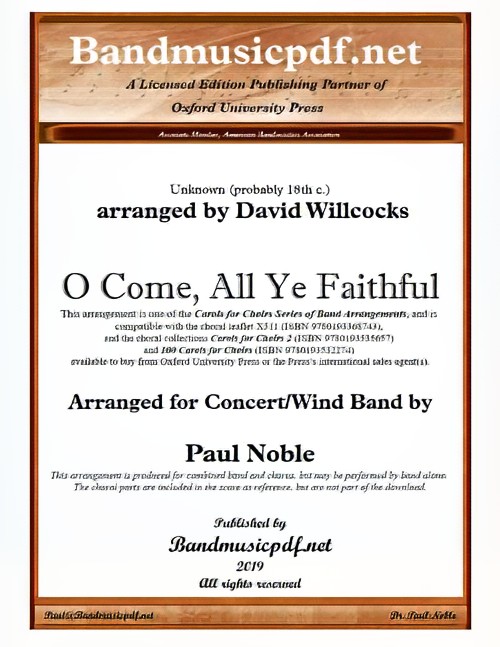 £75.00
£75.00O Come, All Ye Faithful (Concert Band with Optional Choir - Score and Parts) - Noble & Willcocks
O Come, All Ye Faithful (originally written in Latin as Adeste Fideles ) is a Christmas carol that has been attributed to various authors, including St. Bonaventure in the 13th century or King John IV of Portugal in the 17th, though it was more commonly believed that the text was written by Cistercian monks - the German, Portuguese or Spanish provinces of that order having at various times been credited. In modern English hymnals the text is usually credited to John Francis Wade, whose name appears on the earliest printed versions. A manuscript by Wade, dating to 1751, is held by Stonyhurst College in Lancashire. The version published by Wade consisted of four Latin verses. But later in the 18th century, the French Catholic priest Jean-Francois-tienne Borderies wrote an additional three verses in Latin; these are normally printed as the third to fifth of seven verses. O come, all ye faithful ranks as one of the most popular Christmas carols ever written, and the descant by David Willcocks has become famous the world over. This arrangement represents one in the Series of Band Arrangements compatible with David Willcocks' Carols for Choirs.
Estimated dispatch 7-14 working days
-
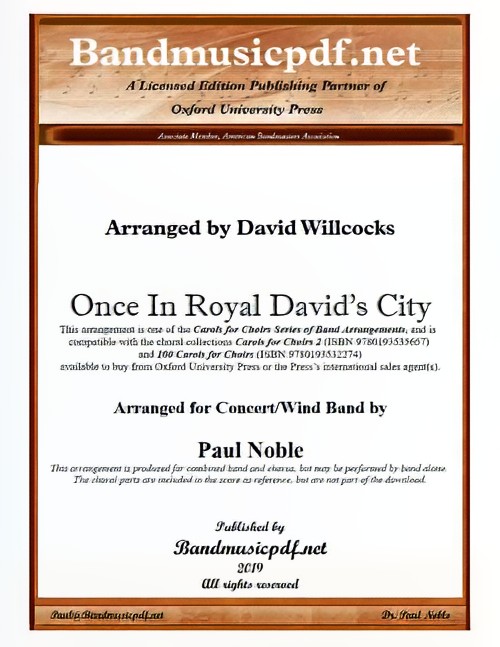 £75.00
£75.00Once in Royal David's City (Concert Band with Optional Choir - Score and Parts) - Noble & Willcocks
Once in Royal David's City is a Christmas carol originally written as a poem by Cecil Frances Alexander. The carol was first published in 1848 in her hymnbook Hymns for Little Children. A year later, the English organist Henry John Gauntlett discovered the poem and set it to music. According to The New Oxford Book of Carols, the text was conceived by Cecil Alexander after overhearing a group of her god children complaining about the dreariness of the catechism. Cecil masterfully took doctrines from the Apostle's Creed and simplified them for her hymns. Cecil wrote about 400 hymns in her lifetime, among which are All things bright and beautiful and There Is a Green Hill Far Away. She used the money for charitable purposes, and was a tireless advocate (and visitor) of the poor and sick. Henry John Gauntlett had spent the first half of his career as a lawyer before abandoning his practice to pursue music. He served as the organist at a number of leading London churches. Gauntlett was a prolific writer and is said to have composed over 1000 hymn tunes. He made tremendous contributions to the world of music, even inventing mechanical improvements to the organ. As a result, he was praised by the famous Felix Mendelssohn and was awarded an honorary doctorate in music from the Archbishop of Canterbury. In 1919, Arthur Henry Mann, organist at King's College (1876-1929), introduced an arrangement of Once in Royal David's City as the processional hymn for the service. In his version, the first stanza is sung unaccompanied by a boy chorister. The choir and then the congregation join in with the organ on succeeding stanzas. This has been the tradition ever since. It is a great honor to be the boy chosen to sing the opening solo--a voice heard literally around the world. In this arrangement for band accompaniment, the first five verses may be performed as directed by the conductor, with different groupings of instruments for each verse, i.e., Vs.1, A cappella; Vs. 2, Fl., Oboe, E.H., Bsns; Vs. 3 Cl., Saxes; Vs. 4, Brass; Vs. 5, All, and Vs. 6 as written with featured descant. This arrangement is one of the Series of Band Arrangements compatible with the David Willcocks Carols for Choir, Book 2 (#31).
Estimated dispatch 7-14 working days

